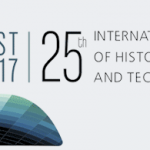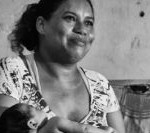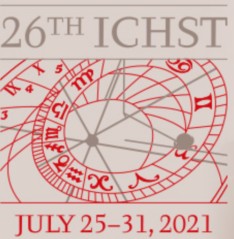July 2015

Tara Inniss explains the concept of race-based medicine in the British Caribbean during workshop on tropical diseases. (Credit: Roberto Jesus Oscar/Casa de Oswaldo Cruz)
Carola Mittrany | HCS-Manguinhos Blog
In the early 20th century, the discourse surrounding the genetic immunity of the black race against communicable ‘tropical’ diseases such as malaria and yellow fever continued to confound epidemiologists studying the various mosquito-borne infections plaguing the Caribbean region.
Internationally, leading yellow fever specialists like Dr. Juan Guiteras who traveled to Barbados in 1917 to investigate reports of a ‘new’ outbreak of yellow fever quashed fears that the disease had once again struck the island on the basis that most of the victims were black and therefore had immunity from the disease.
In Shifting Diagnoses: Epidemic Disease and Race-based Medicine in the British Caribbean discussed at the workshop Tropical Diseases in Latin America and the Caribbean: A Historical Perspective, Tara Inniss, from the Department of History and Philosophy at The University of the West Indies, Cave Hill Campus, Barbados, explores how racial categorizations of the impact of disease continue to form a major part of epidemiological investigation in the region. Especially with growing concern over a range of non-communicable diseases such as hypertension and diabetes that seemingly affect the Afro-Caribbean population disproportionately more than any other population group in the region.
These early shifting discussions over race-based immunity provide insight into the evolution of race-based medicine in the region. Using records on yellow fever and malaria outbreaks in the island of Barbados, her paper looks at how racial difference was perceived by physicians in the region from the late 19th to early 20th centuries.
In this exclusive interview with HCS-Manguinhos Blog, Inniss takes a current look at the concept and discusses its relevance today as part of medical investigations.

House-to-house inspection. Bridgetown, Barbados. Early morning visit. (Credit: Sir Rubert Boyce’s Health Progress and Administration in the West Indies. London: John Murray, 1910).
Could you discuss further the concept of ‘race-based’ medicine in the Caribbean?
Race-based medicine emerged over the course of the region’s long experience with the enslavement of millions of Africans who were imported in the trans-Atlantic Slave Trade as a cheap, coerced labour force to work the region’s plantations and develop those systems as they shaped the colonial output of European empires in the Caribbean and Latin America.
In order to justify the mass importation of African labour by the end of the 16th century, European observers insisted on the perceived suitability of the African labourer over the indigenous and European worker to the local ‘tropical’ environment citing the ‘strength’, ‘constitution’ and survival of the African worker as superior. As indigenous populations plummeted with the onset of the encomienda system and infectious disease which tore apart the societies and cultures of the region, and the European labour force was increasingly elevated through a race-based caste system to positions of even marginal superiority beyond indentureship by the mid to late 17th century, African labour was increasingly replacing those sources in order to become the dominant labour force in the region by the late 17th century.
Shifting perceptions about African health in the region aided this process despite the dire demographic reality that suggested imported enslaved labour was so cheap that it could replace the African labour force in the Caribbean when the majority of workers died from maltreatment, overwork and disease. Observers remarked on the ability of Africans to survive bouts of epidemic infectious diseases like yellow fever and smallpox and their so-called suitability to the tropical environment and agricultural labour. Centuries of justification coalesced in deeply held racial assumptions about the disease immunity of Blacks in the Caribbean especially by the 19th century, although there was an underlying lack of consensus among observers and physicians throughout the slave and post-emancipation periods.
Is it possible to affirm that ‘race-based’ medicine is still in practice in the region? If so, please give some examples.
It is apparent that some level of race-based medical research is still practiced within and about the Caribbean region. Usually discussions of disease frequencies in populations and some genetic research into diseases such as hypertension, diabetes and prostate cancer are often framed by underlying racial assumptions of difference, which are similarly communicated in the media.
Valid or not in research design and methodology, these assumptions perpetuate notions of biological difference. For example, hypertension in blacks or Afro-Caribbean populations is seen to require different treatment than among hypertensives in other African-descended groups as well as European or Asian populations.
I am not saying that research today is not validated by cultural or genetic variations across different ethnic groups, I am saying that perceptions of difference have not fully receded to the background of scientific inquiry and still remain part of medical investigations.

Rubbish removed from yards in Bridgetown, Barbados. (Credit: Sir Rubert Boyce’s Health Progress and Administration in the West Indies. London: John Murray, 1910).
Are there any measures taken by the local governments and/or international organizations to even out such race-based assumptions? Or would you say that local and/or international actors contribute to this (intentionally or unintentionally)?
It is not clear whether this is the case or not. I think if we look at the past, we can almost consistently see a certain lack of consensus among medical practitioners regarding the racial incidence of disease. However, when there are political or social shifts in racial discourse occurring in the wider society, such as with the rise of eugenics in the early 20th century or certain fears about ‘diseased’ migrant workers moving around the region, race-based views also tend to become more dominant, or rather, researchers holding such views find a greater audience.
The point is that race is never silenced in scientific inquiry, and we can be sure that it is a part of how local and international agencies and public health practitioners administer public health, often increasing at times when economic resources are constrained and greater social inequality prevails globally.
Read Shifting Diagnosis: Epidemic Disease and Race-based Medicine in the British Caribbean abstract by Tara Inniss.
See related articles in HCS-Manguinhos:
Tropical medicine in the 19th and 20th centuries. Editor’s note of HCS-Manguinhos (vol.21, no.2, Apr./Jun. 2014) by Jaime Benchimol.
See further presentations at the workshop:
La cólera, la desinformación y el comercio en Veracruz. Beau Gaitors y Chris Willoughby exploran el problema comercial y sanitario enfrentado por el puerto mexicano en el siglo 19.
The polar chamber and the freezing of Cuba politics. Francisco Javier Martínez-Antonio explains the polar chamber’s way to freeze Cuba in medical and political terms in the 19th century.
El combate de la fiebre amarilla en Guatemala y las bananas. Talia Rebeca Haro Barón discute la intervención de actores locales y extranjeros en el control de la fiebre amarilla y la transformación del conocimiento científico.
La fiebre amarilla y la medicina china en Perú. Artículo de Patricia Palma explora el crecimiento de diversos saberes médicos durante y tras la epidemia de fiebre amarilla en Lima, Perú.
A history of yellow fever, environment and nationalism in 19th century Florida, US. Elaine LaFay discusses how regional assessments raise questions about meanings of tropicality and cultural understandings of tropical diseases.
How to cite this post [ISO 690/2010]:
“Race is never silenced in scientific inquiry”. Hist. cienc. saude-Manguinhos online [viewed on DD MM AAAA]. Available at <http://www.revistahcsm.coc.fiocruz.br/english/race-is-never-…ntific-inquiry/> ISSN 1678-4758.








